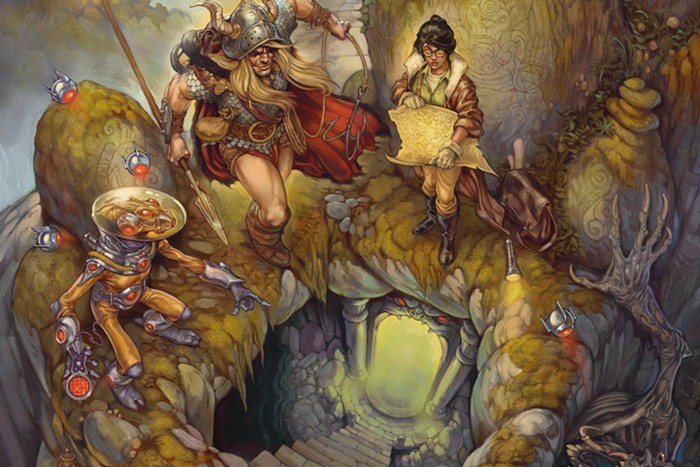BLACK, WHITE, AND JEWISH: AUTOBIOGRAPHY OF A SHIFTING SELF
by Rebecca Walker
(Riverhead Books)
$23.95
Memoir, in this first-person-flooded market, means either the stylish stylings of Mary Karr, or the dark horror of Frank McCourt. But with Black, White, and Jewish, Rebecca Walker has produced something entirely different: an autobiography that reads as if the skin that keeps us separate from one another has been unceremoniously removed. The result is a life rendered without apology, without self-deprecation, without any of the obfuscation language usually provides.
Walker, the daughter of black novelist Alice Walker and activist Jewish lawyer Mel Leventhal, enters the world in 1969 with some pretty heavy baggage. Her father's family has disowned him, her mother's fame is growing, and neither of them has much time to spend raising their "Movement Baby." They divorce when Walker is eight years old, and her life becomes a complicated mix of travel, private schools, race confusion, drugs, and sex. Walker writes about all this straightforwardly: "I have never been at home in my body. Not in its color, not in its size or shape." She relates to people fiercely; a fist fight with her best friend describes this desire for intimacy: "I have a mouthful of Lena's light brown hair between my lips, can feel the strands coarse against my tongue. I feel relief there on the couch with my fingernails gouging into her skin. I can smell her, the milky blend of Silkience shampoo and patchouli oil, taste her. She is finally close enough." TRACI VOGEL
Rebecca Walker reads on Thurs Jan 18 at Elliott Bay Books, 7:30 pm, free advance tickets.
HORNITO: MY LIE LIFE
by Mike Albo
(HarperCollins)
$23
Not judging a book by its cover is strictly a pre-postmodern concept; these days you can learn a lot about a book before you even open it. The cover of performance artist Mike Albo's debut novel, Hornito, contains a pair of stacked black-and-white photographs, one of a volcano, one of the bulge in a pair of briefs; silver holographic foil; and a subtitle: My Lie Life. What you might deduce is that this is a story about desire, set in the '70s, somewhere between memoir and fiction. And you would be right.
But of course a cover is not a novel and you have to read to discover Albo's motor-mouth grace, his talent for devastating moments among smart-aleck speculations and lists of brand names. Hornito is the story of another Mike Albo, languishing at a temp job at the American Liver Association in present-day New York, taking lover after lover but nursing a high-octane flame for Eric, a go-go boy with a steady boyfriend. To understand the pain this unsatisfying affair causes him (or perhaps to masochistically aggravate it), Mike looks back toward its source, growing up in suburban Virginia in the '70s and '80s. Seeing his child self split between the things he loves (such as his Steve Austin doll) and the kind of boy he's expected to be, this teaches him the difference between the intensity of wanting something and the necessity of keeping it to yourself. The tone shifts from tart cynicism to self-deprecating sentimentality, sometimes within the space of a paragraph; the chopped narrative suggests another, more abused postmodern technique, but the effect is additive rather than fractured, building a story out of the episodes we sometimes can't bear to tell ourselves. It slowly dawns on Mike that the truth is something you can circle and circle but perhaps never catch, and even the moments of greatest clarity must be continually revisited and tested.
"I am just one of a billion polluted people in a plaza of pollutants," he realizes--one of the many torn between shame and desire. EMILY HALL
LOST AND FOUND
ALI AND NINO
by Kurban Said
(Anchor)
$13
First published in Vienna in 1937, the provenance of Ali and Nino remained misty until recently, when it was established that "Kurban Said" was really a pseudonym for a collaboration between a Jewish man (who had converted to Islam) and an Austrian baroness. The novel revolves around such mixed identities, featuring Ali, an Azerbaijani Shiite Muslim boy, and Nino, a Georgian Orthodox Christian girl, who fall in love in WWI-era Baku, on the Caspian Sea.
But despite the new Anchor paperback edition's tacky romance cover, Ali and Nino is much more than a love story--this slender novel offers unforgettable lessons in history, geography, religion, and cross-cultural empathy. Richly detailed settings and finely crafted characters brilliantly illuminate pre-Russian Revolution Transcaucasia, a continual battleground overrun by Turks, Persians, Armenians, and finally, Russians. While Ali is disgusted with the Europeans' alcoholism, bad manners, arrogant nationalism, and treacherous brutality, Nino is horrified by the Muslim treatment of women, the use of eunuchs, and the bloody Shiite self-flagellation rituals.
Somehow, though, the novel finds common ground, and we are left with a feeling of shared humanity. It's not a pretty romance, riddled as it is by war and tragedy, but Ali and Nino convey that most sought-after quality among lovers: true empathy, exemplified by the sacrifices each has to make to accommodate the other. "Surely love is the same in Georgia as in Iran," Ali says to Nino. Maybe so. MELODY MOSS


















